- Home
- Philip Roth
The Anatomy Lesson Page 14
The Anatomy Lesson Read online
Page 14
It wasn’t clear how much the “guy like you” had been offended by the allusion. He was dressed in a gray double-breasted chalk-stripe suit and a maroon silk tie, a tall, fit gray-haired man in his fifties who, though perhaps not accustomed to such a casual insult, was not about to take too seriously the provocations of a social inferior. Zuckerman imagined Diana’s father looking rather like this. He asked Zuckerman, “What’s your name, sir—may I ask?”
“Milton Appel. A-p-p-e-i. Accent on the second syllable. Je m’appelle Appel.”
“Well, I’ll keep an eye out for your journal.”
Putting me down. “You do that,” Zuckerman said. His neck was hurting and he got up and went off to the toilet to finish the joint.
They were high over the lake, still way above the rippling gray water and the zigzag slabs of floating ice, when he got back to his seat. Wide stretches of the lake were frozen over completely and strewn with shards of ice, a vast waste of slivers looking like the wreckage of millions of frosted light bulbs jettisoned from the sky. He’d expected that they’d already be passing over the Gold Coast towers and buckling their belts to land. Maybe the descent he’d imagined hadn’t been the plane’s but his own. Probably he should have tolerated this resurgence of pain instead of piling more grass on top of the pills and the vodka. But his plan wasn’t to lie on his back for the rest of the day after they had landed. Flipping through the faculty register in the medical-school catalogue, he’d come upon the name of one of his oldest friends, Bobby Freytag. In their freshman year, they’d been thrown together as roommates just across the Midway in Burton Judson Hall. Now Bobby was a professor of anesthesiology in the School of Medicine and on the staff at Billings Hospital. Knowing Bobby was going to expedite everything. His first lucky break in a year and a half. Nothing now was going to stop him. He’d give up New York and move back to Chicago. It was more than twenty years since his graduation. How he’d loved it out there then! Eight hundred miles between him and home: Pennsylvania, Ohio, Indiana—the best friends a boy ever had. He figured he’d live in Chicago forever, after only his first day. He felt as though he’d come out from the East by covered wagon, a removal that immense, that final. He became a large, hearty American six-footer and a contemptuous bohemian all at once, and returned home twelve pounds heavier for his first Christmas vacation, ready to pick a fight with the nearest philistine. In his first year at Chicago he’d go down to the lake and make noises there alone on starry nights—the Gantian goat cry he’d read about in Of Time and the River. He carried The Waste Land with him on the El, reading away until Clark Street, where girls no older than himself were taking their clothes off in the striptease bars. If you bought them a drink when they came down off the runway, they did you a favor and put a hand on your cock. He wrote people letters about this. He was seventeen and thought continuously about his courses, his cock, and his pals Pennsylvania, Indiana, and Ohio. Talk to him about medical school in those days and he would have laughed in your face: he wasn’t about to spend his life writing out prescriptions. His life was too big for that. Inspiring teachers, impenetrable texts, neurotic classmates, embattled causes, semantic hairsplitting—”What do you mean by ‘mean’?”—his life was enormous. He met people his age who were brilliant but terrifically depressed, couldn’t get up in the morning, didn’t go to class or finish courses. He met geniuses sixteen years old who’d placed out of the college in two quarters and were already beginning law school. He met girls who never changed their clothes, who wore black makeup around their eyes and the same Left Bank outfit every day, bold, brash, talkative girls with hair halfway down to their black stockings. He had a roommate who wore a cape. He wore a field jacket and khaki trousers, like the last of the ex-GIs. In Stineway’s Drugstore he saw people with white hair who’d begun in the college long before the war and were still hanging around contemplating their incompletes and trying to get laid. He joined the Film Society and saw Bicycle Thief and Open City and Les Enfants du Paradis. They were a revelation to him. So was Professor Mackauer’s “History of Western Civilization”—so was the wallowing in ass-wiping throughout Rabelais and all the ripened turds dotting Luther’s Table Talk. He’d study from six till ten every night, then head off to Jimmy’s, where he waited with his friends for the racier members of the faculty to show up. A sociologist of pop culture who’d once worked in the fallen world for Fortune would drink with them some nights until closing time. Even more glamorous was his teacher in Humanities 3, “a published poet” who’d parachuted into occupied Italy for the OSS and still wore a trench coat. He had a broken nose and read Shakespeare aloud in class and all the girls were in love with him, and so was young Zuckerman. He taught them The Poetics, The Oresieia, Passage to India, The Alchemist, Portrait of the Artist, King Lear, The Autobiography of Benvenuio Cellini—taught them all like holy books. Enrico Fermi gave a lecture in their physical-science survey course and did the ingratiating number up at the blackboard about needing help with the math. When the students clustered around after to ask the usual dumb celebrity questions, he had dared to inquire of the theoretician of The Bomb what he was doing now. Fermi laughed. “Nothing very important,” he told him; “after all, I was trained in pre-Fermi physics.” It was the cleverest remark that he had ever heard. He was becoming clever in conversation himself, droll, quick, deliciously self-effacing—and full of disgust for the country and its values. The worst days of the Cold War and they were studying The Communist Manifesto in the social-science course. On top of being a Jew in Christian America, he was becoming a member of yet another unloved, suspect minority, the “eggheads” ridiculed by the Chicago Tribune, the cultural Fifth Column of the commercial society. For weeks he mooned after a tall blond girl in a plaid flannel skirt who painted abstract pictures. He was floored when he found out she was a lesbian. He was rapidly growing sophisticated—Manischewitz and Velveeta had by now been superseded by “wine and cheese,” Taystee Bread by “French” bread when he could afford to eat out—but a lesbian? It never occurred to him. He did. however, have a girl friend, very briefly, who was mulatto. Fondling madly beneath her sweater in the basement of Ida Noyes Hall, he was still sufficiently analytical to think, “This is real life,” though nothing in life had ever seemed stranger. He made a friend a few years older than himself, a Stineway’s regular, who was in psychoanalysis, smoked marijuana, knew about jazz, and was a self-proclaimed Trotskyism To a kid in 1950 this was hot stuff. They went to a jazz club up on Forty-sixth Street, two white Jewish students studiously listening to the music, surrounded on every side by dark, unfriendly, very unstudious faces. One thrilling night he listened to Nelson Algren talk about the prizefights at Jimmy’s. Thomas Mann came to Chicago during his first term; he spoke at Rockefeller Chapel. Great event: the Goethe Bicentennial. In a German accent Mann spoke the richest English he had ever heard; he spoke prose, elegant and powerful and clear—with withering urbanity, pungent phrases intimately describing the genius of Bismarck, Erasmus, and Voltaire as though they were colleagues who’d been to dine at his house the evening before. Goethe was “a miracle.” he said, but the real miracle was to be two rows down from the podium, learning from the Good European how to speak your own tongue. Mann said “greatness” fifty times that afternoon: Greatness, Mighty, Sublime. He phoned home that night in ecstasy from ail the erudition, but nobody in New Jersey knew who Thomas Mann was, or even Nelson Aigren. “Sorry.” he said aloud, after hanging up, “sorry it wasn’t Sam Levenson.” He learned German. He read Galileo, St. Augustine, Freud. He protested the underpaying of the Negroes who worked at the university hospital. The Korean War began and he and his closest friend declared themselves enemies of Syngman Rhee. He read Croce, he ordered onion soup, he put a candle in a Chianti bottle and threw a party. He discovered Charlie Chaplin and W. C. Fields and documentary films and the dirtiest shows in Calumet City. He went up to the Near North Side to look down his nose at the advertising types and the tourists. He swam off the Point with a logical
positivist, he savagely reviewed beat novels for The Maroon, he bought his first classical records —the Budapest String Quartet—from a homosexual salesman at the co-op whom he called by his first name. He began in conversation to call himself “one.” Oh, everything was wonderful, as big and exciting a life as could be imagined, and then he made his first mistake. He published a short story while still an undergraduate, an “Atlantic First”—ten pages about a family of Newark Jews clashing with a family of Syrian Jews in a rooming house at the Jersey shore, the conflict loosely modeled on a battle provoked by a hot-headed uncle and narrated to him (disapprovingly) by his father on a visit home. An Atlantic first. It looked as though life had become bigger yet. Writing would intensify everything even further. Writing, as Mann had testified—not least by his own example—was the only worthwhile attainment, the surpassing experience, the exalted struggle, and there was no way to write other than like a fanatic. Without fanaticism, nothing great in fiction could ever be achieved. He had the highest possible conception of the gigantic capacities of literature to engulf and purify life. He would write more, publish more, and life would become colossal.
But what became colossal was the next page. He thought he had chosen life but what he had chosen was the next page. Stealing time to write stories, he never thought to wonder what time might be stealing from him. Only gradually did the perfecting of a writer’s iron will begin to feel like the evasion of experience, and the means to imaginative release, to the exposure, revelation, and invention of life, like the sternest form of incarceration. He thought he’d chosen the intensification of everything and he’d chosen monasticism and retreat instead. Inherent in this choice was a paradox that he had never foreseen. When, some years later, he went to see a production of Waiting for Godot, he said afterwards to the woman who was then his lonely wife, “What’s so harrowing? It’s any writer’s ordinary day. Except you don’t get Pozzo and Lucky.”
Chicago had sprung him from Jewish New Jersey, then fiction took over and boomeranged him right back. He wasn’t the first: they fled Newark, New Jersey, and Camden, Ohio, and Sauk Centre, Minnesota, and Asheville. North Carolina; they couldn’t stand the ignorance, the feuds, the boredom, the righteousness, the bigotry, the repetitious narrow-minded types; they couldn’t endure the smallness; and then they spent the rest of their lives thinking about nothing else. Of all the tens of thousands who flee, those setting the pace for the exodus are the exiles who fail to get away. Not getting away becomes their job—it’s what they do all day.
Of course he now wanted to become a doctor instead—to escape not only the never-ending retrospection but all the quarrels he’d provoked by drawing his last novel from the original quarrel. After the popular triumph of his devilish act of aggression, the penitential act of submission. Now that his parents were gone he could go ahead and make them happy: from filial outcast to Jewish internist, concluding the quarrel and the scandal. Five years down the line, he’d take a residency in leprosy and be forgiven by all. Like Nathan Leopold. Like Macbeth, after ordering the last innocent carcass to be dumped in a ditch, joining Amnesty International.
Won’t do, thought Zuckerman. No, won’t work. A seriously sentimental illusion. If you kill a king, kill a king—then either break down and ruin yourself or. better still, step up to be crowned. And if it’s lay on MacAppel, then so be it.
“You know why I can’t get national distribution?” he said, turning to the man in the seat beside him. “Because my magazine isn’t as boring as his.”
“You mentioned that.”
“His is just an obsession with big-titted women. That and Hefner shooting off his mouth about the First Amendment. In Lickety Split, everything’s in it. I don’t believe in censorship anywhere. My magazine is a mirror and we reflect it all. I want my readers to know that they shouldn’t feel self-hatred if they want to get laid, if they jerk off it doesn’t make them beneath contempt. And they don’t need Sartre to make it legit. I’m not gay, but we’re starting to run a lot of stuff on it. We help out married men who are looking for quick sex. Today most of the blow jobs are being given by guys who are married. You married?”
“Yes, I happen to be married. Happen to have three children.”
“And you didn’t know that?”
“No, I didn’t.”
“Well, you wouldn’t know it from Playboy. Not for Hefner’s readers, not that stuff. Not for The Wall Street Journal either. But in the back of movie theaters, in the washrooms of bars, outside the diners where the truck drivers stop—most of the blow jobs in America, being given right there. Sex is changing in America—people are swinging, eating pussy, women are fucking more, married men suck cocks, so Lickety Split reflects that. What are we supposed to do—lie? I see the statistics. These are real fundamental changes. As a revolutionary it’s never enough for me. I feel it’s so slow. Still, over the last decade semen production is up in America by at least two hundred percent. Only you’re not going to find that out reading Business Week. You talk about Playboy. The married guy like you who looks at Playboy, he looks at those bunnies and the woman is inaccessible, it’s the girl you can never get. Fine. Beats off and gets back in bed with his wife. But in Lickery Split, if you look at the broads, you know you can have them for a phone call and fifty bucks. It’s the difference between infantile fantasy and reality.”
“Well.” replied the man beside him, turning away again to file the last of his papers. “I’ll keep my eye out for it.”
“You do that,” Zuckerman said. Yet he didn’t feel like stopping, not even if this guy had had it. It was starting to be real fun being the pornographer Mitton Appel. A little holiday from Zuckerman.
Well, not quite—but why quit? “Know how I began Licketv Split?”
No reply. No. he obviously didn’t care to know how Appel had begun Lickety Split. But Nathan did.
“I used to own a swinging club,” Zuckerman said. “Eighty-first Street. Milton’s Millennia. You never heard of that either.
It was a membership club. No prostitution, no one paying for sex, and there was no law they could bust me on. Consensual sex, and in New York that’s legal. They just harassed me to death, that’s all. My fire extinguisher is twelve inches off the ground and not six inches off the ground. I lose my liquor license. Suddenly there’s a broken main and no running water in the showers. The time wasn’t ripe for it, that’s all. Well. I had a manager there who’s now in jail for forgery. He got six years. A very sweet guy named Horowitz. Mortimer Horowitz.” Mortimer Horowitz was Inquiry’s editor in chief. “Another Jew,” said Zuckerman. “There are a lot of Jews in the business. Jews gravitate to pornography like to the rest of the media. You Jewish?” he asked.
“No.”
“Well, most of the pornographers who arc successful arc Jews. And Catholics too. You Catholic?”
“Yes,” he said, no longer making the effort to disguise his annoyance. “I am Roman Catholic.”
“Well, a lot are Roman Catholics. Who are rebelling. Anyway, Horowitz was sort of fat”—indeed he was, the son of a bitch—”and he sweats, and I liked Horowitz. He’s not very deep. but he’s a sweet sort of schmuck. A nice man. Well, sexually Horowitz was very boastful, so I bet him a thousand dollars, somebody else bet him two thousand dollars, somebody else bet him five thousand dollars, how many orgasms he could have. He said he could come fifteen times in eighteen hours. He came fifteen times in fourteen hours. We had a medical student there who checked the ejaculation. He’d have to pull out so we could check each time. This is in a dark room at the back of Milton’s Millennia. 1969. He’s fucking a woman, then he’d be yelling I’m coming, the medical student would run over with a flashlight. and we’d see the come. I remember standing there and saying, ‘This is my life, and it’s not perverse, it’s fascinating.’ I remember thinking. ‘When they do The Milton Appel Story this’ll be a great scene.” But what really got me was this fascination. I thought, ‘We keep records about everything. Assists. Hits. Batti
ng averages. Why not cock? Here’s Horowitz and this great record that should be on the front page of The New York Times, and nobody knows about it.’ That was my cover story in the first issue of Lickety Split, Four years ago. Changed my life. Look, I wouldn’t want a magazine like Playboy, not if I was guaranteed five hundred million—”
The plane banged down on the runway. Zuckerman was back. Chicago! But he couldn’t stop. What fun this was! And how long since he’d had any. How long before he’d have any again. Back to school for four more years.
“Some guy calls the other day and says, ‘Appel. how much would you give to publish pictures of Hugh Hefner fucking?’ He says he can get his hands on a dozen pictures of Hefner fucking his bunnies. I told him I wouldn’t give him a dime. ‘You think it’s news that Hugh Hefner fucks? Get me pictures of the Pope fucking—then we can do business.’”
“Look here,” said the man beside him. “that is quite enough!” and suddenly he had undone his seat belt and, though the plane was still careening down the runway, jumped across the aisle to an empty seat. “Sir!” called the stewardess. “Remain where you are till we reach the gate, please.”
Before even waiting for the luggage to appear, Zuckerman found a pay phone and called Billings Hospital. He had to feed a second dime into the phone while waiting for the secretary to find Bobby. Couldn’t hang up to be called back later, he told her; he was an old friend just arrived in town and he had to speak to Dr. Freytag right away. “Well, he’s stepped down the corridor...” “Try to get him. Tell him it’s Nathan Zuckerman. Tell him it’s very important.”
“Zuck!” said Bobby, when he came to the phone. “Zuck, this is terrific. Where are you?”

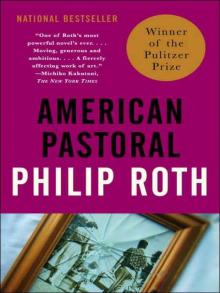 American Pastoral
American Pastoral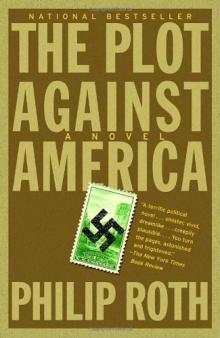 The plot against America
The plot against America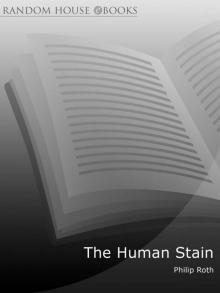 The Human Stain
The Human Stain Nemesis n-4
Nemesis n-4 Sabbath’s Theater
Sabbath’s Theater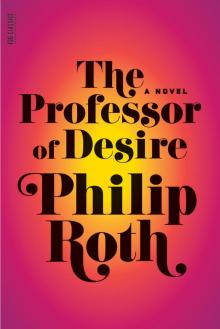 The Professor of Desire
The Professor of Desire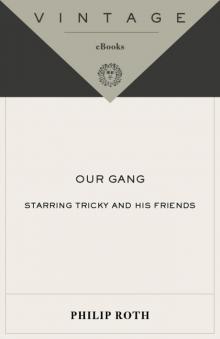 Our Gang
Our Gang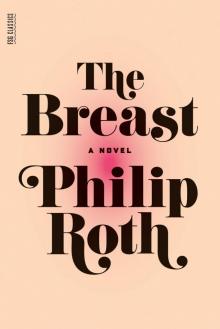 The Breast
The Breast Operation Shylock
Operation Shylock The Dying Animal
The Dying Animal Letting Go
Letting Go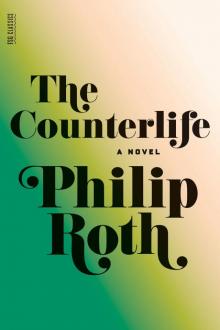 The Counterlife
The Counterlife Everyman
Everyman Nemesis
Nemesis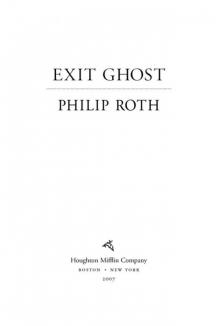 Exit Ghost
Exit Ghost Portnoy's Complaint
Portnoy's Complaint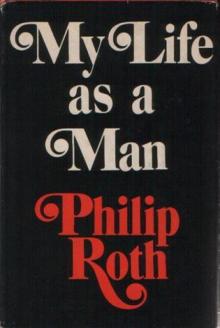 My Life as a Man
My Life as a Man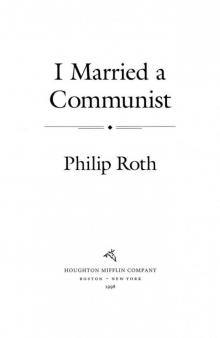 I Married a Communist
I Married a Communist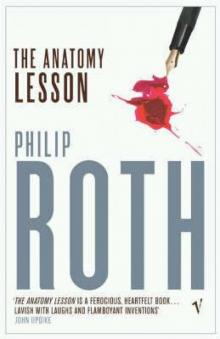 The Anatomy Lesson
The Anatomy Lesson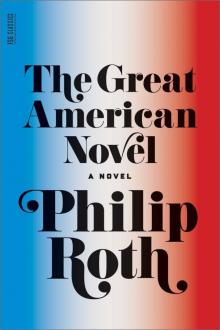 The Great American Novel
The Great American Novel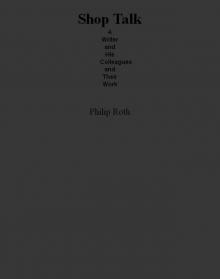 Shop Talk
Shop Talk The Humbling
The Humbling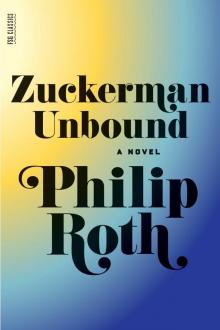 Zuckerman Unbound
Zuckerman Unbound When She Was Good
When She Was Good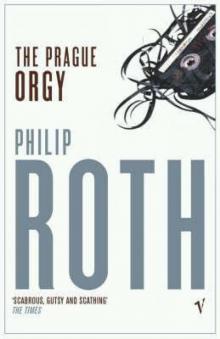 The Prague Orgy
The Prague Orgy American Pastoral (Nathan Zuckerman)
American Pastoral (Nathan Zuckerman) Goodbye, Columbus
Goodbye, Columbus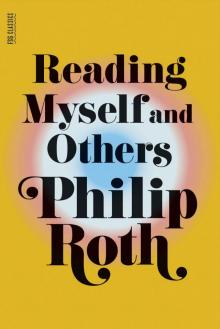 Reading Myself and Others
Reading Myself and Others